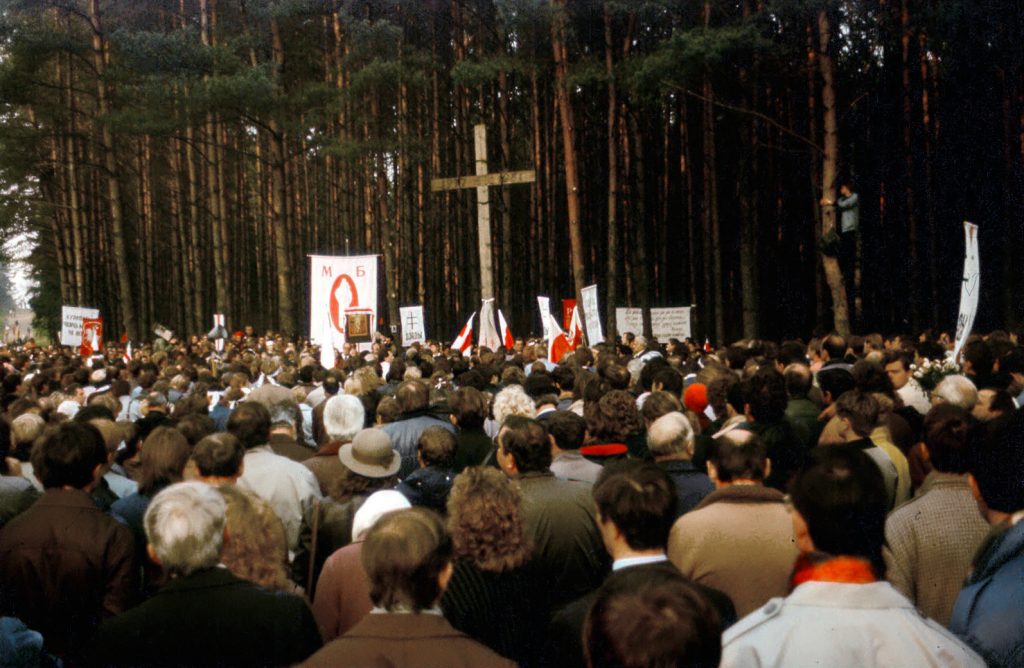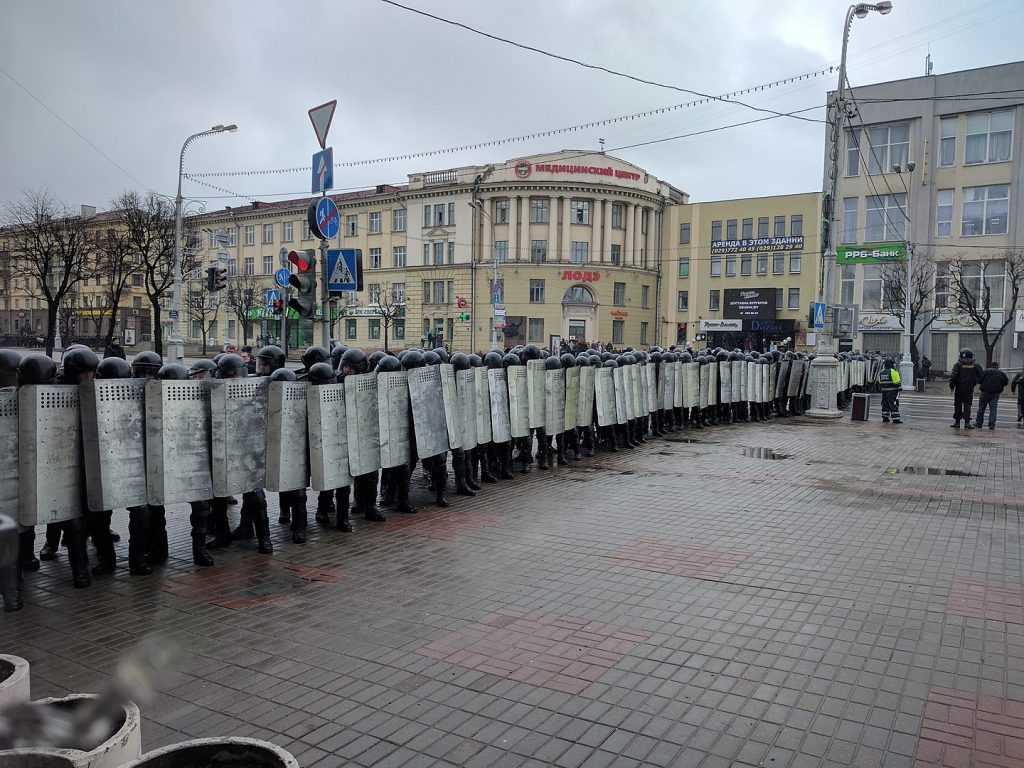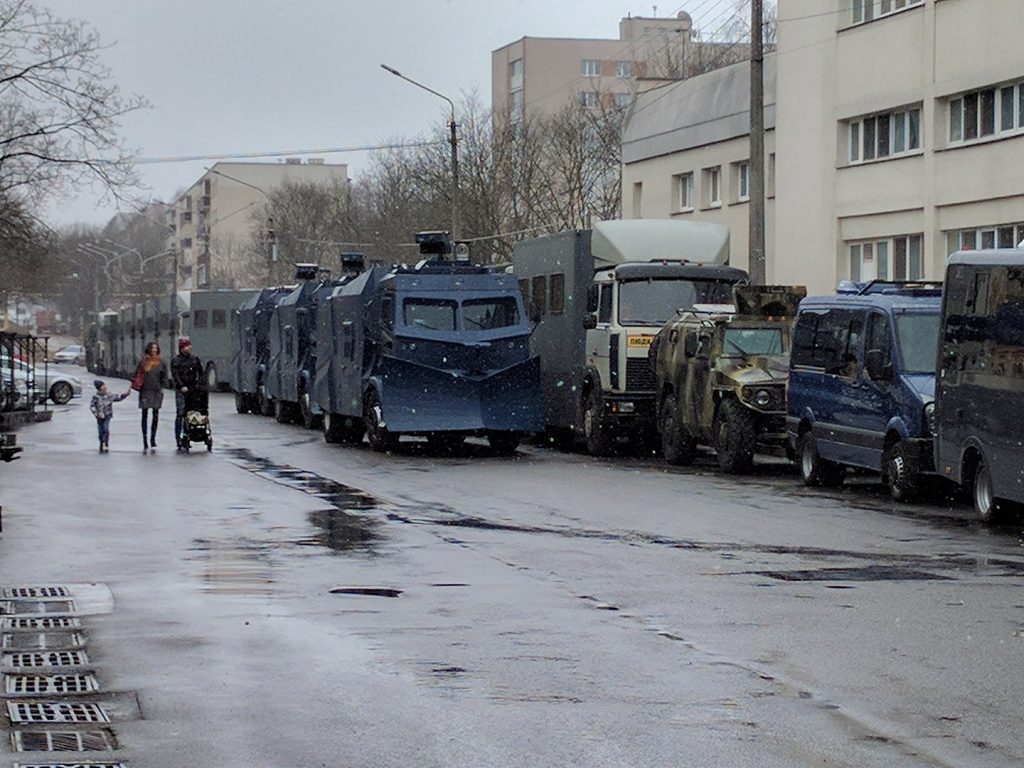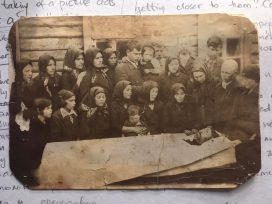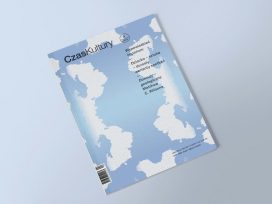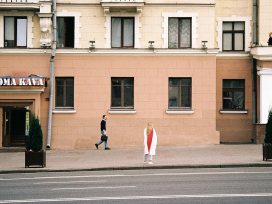On 9 August, presidential elections will take place in Belarus. These are elections that are not elections. Long-term autocrat Aliaksandr Lukashenka has no intention of giving the opposition a chance: challengers are arrested in advance; protests are banned or broken up; the media are attacked and temporarily disabled; activists are arbitrarily detained. The ritual has been the same for over two decades. This time is no exception.
And yet something is also different. On 19 June, thousands of people came together spontaneously in Minsk and other cities to form a ‘chain of solidarity’ with the arrested Viktar Babaryka, the most popular aspiring candidate for the Belarus presidency with over 400,000 signatures. On 14 July, it was announced that Babaryka, along with Valieryj Capkala, another popular opposition candidate, had been denied registration. The response was again massive protests in Minsk and other cities. Thousands of people, largely young, formed human chains across the capital, in some cases resisting arrest and reciprocating police violence (recorded by tut.by). The next day, a kilometre-long human chain formed outside the headquarters of the electoral commission in Minsk. Again, OMON units intervened, arresting people standing in line.
The protests are not confined to Minsk. The regions, which have always been regarded as Lukashenka’s stronghold, also seem to have turned on the regime. The protesters of the past weeks and months have come from all age groups and all occupations. The middle class, which helped Lukashenka to prosper in the 2000s, appears to have shaken off its political apathy and is making its displeasure known. So are many others who until now have never had an argument with the regime.
People like Tatyana Kanevskaya from Homel, who collected signatures for Svetlana Tikhanovskaya, the wife of the popular video blogger Sergey Tikhsnovski – who has also been detained. Kanevskaya described her motivation and fears on tut.by: ‘Everyone is scared. An ordinary person who encounters a system for the first time cannot but be scared. But the faith and support of people gives strength and hope that something will change.’ Or like Lera Jaskevich, who told 34Mag: ‘I feel a huge responsibility for myself, for you and for the country. What is happening now is terrifying. I am very happy and extremely proud of the people who are not afraid to go out and express their position. As if the authorities deliberately ignore our choice, our freedom and our word. It is not right. Our Belarusian people deserve more and better.’
I have been covering Belarus as a journalist for over twenty years, and even I am astonished. This is a country that is generally reluctant to protest and whose inhabitants tend to be thought of as long-suffering. What has happened, then, that a wider public has taken to the streets to vent its disapproval, apparently without being stage-managed by the opposition? Is real change in the air, or is there another explanation? In order to understand what is happening, it helps to take a closer look at the country’s history of nation building, and its mentality and culture.
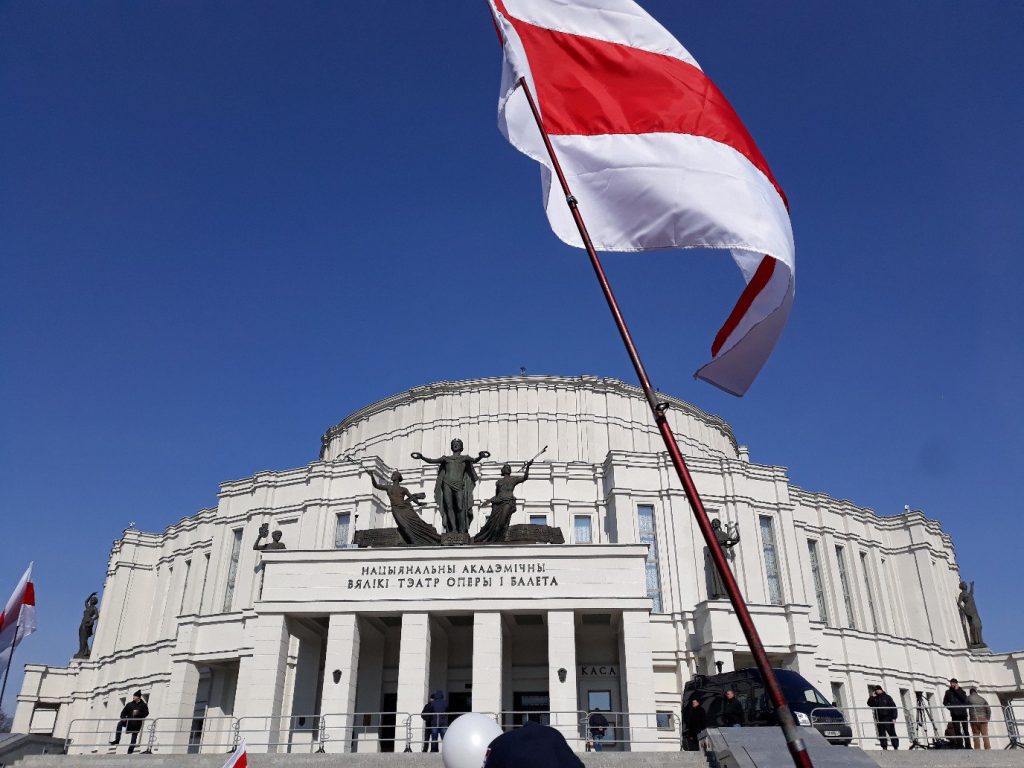
Belarusian democrats commemorate the 100th anniversary of the Belarusian People’s Republic of 1918 in front of the Minsk Opera and Ballet. Photo by Zelyoniy.anton from Wikimedia Commons
‘The main thing is there’s no war’
The writer Vasil Býkaŭ (1924–2003) is revered in Belarus. He spoke out openly in support of Belarusian independence and was an advocate of Belarusian culture and language. He also opposed Lukashenka from the outset, after the latter had put the country back on the road to authoritarianism after its brief detour via democracy.
Býkaŭ’s novels and short stories are set against the backdrop of World War Two, in which he himself fought as an officer in the Red Army. Býkaŭ’s protagonists fear not only external enemies, but also their own people: scheming companions, bloodthirsty partisans and devious communists. What, he asks, makes a person human in extreme situations? When and why do the distinctions between enemies become blurred. Býkaŭ’s writing essentially deals with uncertainty about one’s own existence when threatened by higher powers of all kinds. This is a very Belarusian theme, drawing together all the historical developments that have characterized Belarusian culture and mentality over the centuries.
Until 1991, the Belarusians had never had their own state or culture that they could shape and control. Instead, they had formed part of larger territories: the Grand Duchy of Lithuania, the Polish-Lithuanian Commonwealth, the Tsarist Empire and the Soviet Union. For Belarusians, there was rarely such a thing as an ‘imagined community’. All that connected them was a language expressed in similar dialects but only standardized relatively recently, and customs characterized by archaic forms of culture and an agrarian way of life.
People lived in settlements and on farms separated by dense forests and inaccessible heath and marshland. This further prevented the consolidation of an overarching identity or unifying channels of communication. In her study of the political culture of Belarus, political scientist Elena Bugrova describes how this geography encouraged the development of a ‘unique culture of self-contained communication’ that hampered nation-building.
In addition, people did not call themselves Belarusians, but simply Tuteyshiya (‘locals’). If you wanted to get ahead, you had to follow the ways of life and the cultural codes of the elites of whichever dominant power the territory belonged to. That meant speaking Polish or, during the Tsarist and Soviet periods, Russian. Religion has never bonded Belarusians as Catholicism has the Poles. From the outset, Belarusian identity was riven by volatility, fragility and uncertainty.
Tentative constructions of national identity only emerged in the early twentieth century. These faced strong competition from other concepts of nationhood derived from Lithuania, Russia, Poland and Ukraine. These also claimed elements of the collective history, myths and codes belonging to the area spanning the Kievan Rus’, Sarmatia and the Grand Duchy of Lithuania. Amidst this competition, Belarusian identity had only scant appeal.
At the same time, the vagueness of their identity gave Belarusians an advantage when it came to brute survival. It was not only the imperialistic appetites of powerful neighbours to the west and east that tugged at the Belarusian cultural space; for centuries, the territory was also a march route, an arena of war and place of death and destruction. To protect their existence, people hid in the forests and marshes. When the smoke of war had dispersed, they adjusted to the rules and requirements of their new overlords or occupiers. After all, why make plans for nationhood if another overlord is at the gates the day after tomorrow, bringing different rules and a new political identity?
With only a few exceptions, Belarusians thus played scarcely any role in shaping their own nation. Many analysts still refer to ‘Belarusian individualism’ to describe weak forms of national or civic community, where people have developed individual survival strategies, predominantly for themselves and their families, but without a consensus on how to live together in a community.
The experience of war – the World War Two alone brought death to a quarter of the Belarus population – and other catastrophes such as the Stalinist purges, the Holocaust and Chernobyl has also led to a deep aversion to conflict. Avoidance strategies have been internalized. Lish by ne bylo voiny (‘the main thing is there’s no war’) is a saying passed on from generation to generation. A narrative that my wife, who is Belarusian, heard from her family when she criticized Lukashenka. ‘Be thankful that you never experienced war or Stalin.’ Don’t make a fuss! Don’t stick your neck out! Ne lez’ v politiku! Don’t get into politics! All are common sayings that enforce the image of the patient, passive, sidestepping, long-suffering Belarusian.
In 2015, following the outbreak of war in eastern Ukraine the previous year, Lukashenka made gains in the presidential elections as the guarantor of order, independence and security. Since the start of his presidency, there has been a ‘social contract’ between him and the population. A contract that can be summarized as follows: you give up your political freedoms and in return I will ensure stable and modest prosperity by means of a repressive power vertical. The outbursts of a few liberal non-conformists will be suppressed to prevent them disrupting our peaceful family life. Even today, the government’s pursuit of a guaranteed average monthly salary of 500 US dollars is an expression of this contract.
Unexpected independence
If the Belarusians were long invisible to themselves, then to the outside they did not even exist. This suddenly changed with the fall of the Soviet Union. Independence fell into Belarusians’ laps, without them having yearned for it like the Ukrainians, Balts or Georgians. They did not have to fight to get their country back and they did not know what it felt like to be citizens of their own state, let alone how to shape it. The Belarusian People’s Republic of 1918 was of great importance (as it is today), above all for nationalists, but it was too short-lived to have had a decisive influence on the way the Belarusians conceived of themselves as citizens.
The realization that the country they live in is actually theirs has only begun to dawn in recent decades. The first major step was taken in the second half of the 1980s, when perestroika and glasnost gave new freedom to old aspirations. Although much smaller in the BSSR than the Baltic States, a small national movement emerged that took up the dreams of the early-twentieth-century nationalists. Two historic events prompted other Belarusians who were originally less interested in a national ‘renaissance’ to join the movement: Chernobyl and Kurapaty.
The Soviet authorities’ fatal and cynical policy of secrecy during and after the disaster at the nuclear reactor in Chernobyl in Ukraine, close to the Belarus border, on 26 April 1986 brought home to many Belarusians that the Soviet system attached no value to human life and that it sacrificed its citizens for appearance of stability. Belarusians had the reputation of being particularly dutiful Soviet citizens; Chernobyl, however, eroded their trust in the Soviet apparatus.
The year before, in 1988, a group led by archaeologist and nationalist activist Zianon Pazniak had made public their discovery of a mass grave in Kurapaty, close to Minsk. Until then, the Soviet authorities had maintained that it was victims of the Nazis who were buried there. Extensive excavation and investigation revealed that the grave in fact held up to 250,000 victims of the Stalinist purges, murdered by the NKVD.
Even normal Belarusians, who knew little about their country’s history because of Soviet propaganda, joined the protests. Was it possible to trust a system that claimed to be concerned for the welfare and future of the socialist citizen, but had killed so many of its own people? After Kurapaty, many began to take an interest in Belarusian history and culture. They began to hope that they could take control of their own country. In 1996 I visited Kuraptay with my friend Ihar, who had helped organize protests in the last days of the Soviet Union. ‘If we keep letting ourselves be told who we are,’ he said, ‘if we don’t want to find out for ourselves who we really are and who we want to be, we don’t have a future.’
Important as this new national consciousness was, however, the majority of Belarusians were in favour of remaining in the Soviet Union, from whose planned economy and education system they had benefited. The mass protests of 1989 and 1990 were motivated primarily by discontent with the country’s corrupt leadership and concerns about prospects for people’s work and families. The independence of the BSSR was solely the product of historical circumstance.
After a turbulent experiment with freedom, leading to economic and political crisis, Belarusians expressed their desire for security, stability and order by electing Aliaksandr Lukashenka. The former director of a collective farm was seen as a saviour. He promised to do away with corruption and safeguard jobs by dealing with crisis of the state sector. In 1995, after just a year in power, he put an end to nationalist dreams by introducing symbols adapted from the BSSR and making Russian the official language. He disempowered parliament and began building up a rigid security and power apparatus that cracked down ruthlessly on the opposition.
The nationalists’ politics of memory and identity, which relied extensively on the myths, legends and narratives of the pre-Russian, pre-Soviet era, clashed with Lukashenka’s vintage Sovietization. This duel between different constructs of identity continues to dominate the political arena in Belarus. Even today, nationalists romanticize the sixteenth century as a golden age when the ancient Belarusian vernacular functioned as the administrative language of the Grand Duchy of Lithuania, and when the application of Magdeburg rights in the Belarusian region placed it in the European cultural sphere.
In 1995 and 1996, people’s readiness to protest continued to be animated by the national awakening of the late Soviet period. Demonstrations in Minsk were attended by tens of thousands of people and regularly turned into bloody clashes with the militia. In 1997, on another visit to Minsk, Ihar gave me a set of postcards documenting the escalating violence, with horrifying photos of bleeding demonstrators. Little of the Belarusians’ historical aversion to conflict was in evidence at that time. Over the years, however, the regime became better and better at curtailing protest through legislation, repression and violence. The disappearance in 1999 and 2000 of four members of the opposition, including the former Minister of Internal Affairs Yuri Zaharenko, and the former Vice President of the 13th Supreme Soviet, Viktor Gončar, remains unexplained. There is much evidence that they were murdered by a ‘death squad’.
The nationalist opposition, which had been at the heart of the resistance in the 1990s, became the prime target of the regime. The white-red-white flags of the Belarusian Democratic Republic and the Belarusian language were discredited, in time-honoured Soviet fashion, as ‘symbols of fascism’ – a reference to the nationalists’ collaboration, partly voluntary and partly forced, with the Nazis in WWII. The opposition was denounced as being in the pockets of its western sponsors. At the same time, a neo-Soviet economic system stabilized itself that aimed for modest prosperity. Younger people who did not share the political hopes of their parents’ generation learned to be pragmatic, adapt, and above all to keep a distance from politics.
Lukaschenka is the incarnation of various Belarusian tendencies: provincial and rural, but above all authoritarian and Soviet. Tellingly, he calls himself Batka, a traditional Belarusian word for ‘dad’ that invokes the cultural and historical importance of the family and Belarusians’ pronounced, historically-driven need for security in the immediate social fabric. As the nation’s caring dad and strict family head, he looks after his children and harshly punishes disobedience and dissent. Discipline is exacted by means of an extensive security and judicial apparatus that uses fear and deterrence as forms of control. There are regular crackdowns on demonstrators, opposition politicians, NGOs, activists, media, journalists and bloggers; that imposes custodial sentences and financial penalties; independent news websites are blocked and the internet is disrupted.
Propaganda by state broadcasters BT and ONT not only celebrates Lukashenka as the benevolent father of the nation, but also discredits any activity directed against his monopolization of power. The economic system, which is still regulated to up to 75 per cent by the state and state-owned enterprises, also provides effective mechanisms for controlling and repressing insubordination. The education system is similarly controlled. Students risk being excluded if they take a stand against the regime. As the largest employer, the state can terminate contracts, and thus has a powerful lever at its disposal if employees conspicuously resist the state supplier.
From Lukashenka’s point of view, these methods are justified. After all, it is he who self-sacrificingly fights for the Belarusian family by holding together the state economy. Televised cabinet meetings, in which the autocrat castigates his ministers for their misdemeanours, are part of the ritualized spectacle of family life. This division of roles has worked relatively well for a long time. The economic data have spoken in Batka’s favour. In the 2000s, thanks to cheap oil and gas from Russia and free access to the Russian market, Belarus had some of the best figures for GDP, unemployment and economic productivity in the post-Soviet region. A degree of prosperity was obtained. People could finally go on holiday to Turkey, Italy or Egypt. Older people received a small but secure pension. Some experts even spoke of the ‘Belarusian miracle’.
The Belarusians rewarded Lukashenka with high approval ratings and political quietude. Up until to 2015, between 40 and 60 per cent of the electorate are thought to have supported the president (still lower than the official figure of around 80 percent at presidential elections). It was only those concerned about basic rights and freedoms, civil society and national autonomy that kept getting in the way.
A new opposition?
In the 2000s, encouraged by the coloured revolutions in other countries, protests before and after elections were predominantly focused on Minsk. This was the case in 2004, when Lukashenka overrode the constitution by means of a controversial referendum and granted himself infinitely renewable terms of office. It was the case in 2006, when the opposition erected a temporary tent village on October Square. And it was the case in 2010, when around 40,000 people protested against alleged vote-rigging and were brutally dispersed by the riot police and security services, after which came dozens of trials and the detention of presidential candidates, journalists and activists.
All these protests were more or less peaceful. They were never a real danger to Lukashenka. The majority of Belarusians were not prepared to protest, not only out of fear, but also because they were simply doing too well. The political opposition, which by now had also aged, did not appeal to them with its demands for freedom. Another important reason for absence of opposition was that many activists, students and professionals, who would all have been prepared to take a risk to bring about change, had emigrated to the EU, the USA and Canada. Both factors in combination allowed the authoritarian system to consolidate.
Lukashenka, a confirmed provincial, could never abide Minsk. With its two million plus inhabitants, it has always been the nucleus for those who believed in something resembling political change: artists, students, nationalists, democrats, advocates of civil society. The capital offers the greatest amount of freedom. In the provinces, life is still very Soviet: the state remains the biggest employer. The elites in government, education, justice, the security services and state enterprises are still very close knit and social control is accordingly strong.
Even if the 2000s saw no overwhelming spirit of protest, people’s sense of independence grew, especially amongst younger Belarusians. Lukashenka had begun to play the national sovereignty card more strongly, entering into serious conflict with the Russia from 2004 onwards over reduced tariffs for gas and oil. He used the country’s location between East and West as a geopolitical tool for maintaining his grip, playing Moscow and Brussels off against each another. From the mid-2000s, official denouncements of the Belarusian culture and language largely abated, without the policy of marginalization being halted. All of a sudden, Lukashenka began giving speeches in Belarusian and presenting himself as the protector of national independence. The regime had clearly realized that the younger generation could not be won over with parades and propaganda.
Then, in the run-up to the elections of 2010, regime hardliners dealt the single harsh blow to hopes that Lukashenka would introduce reforms opening up the country to the West. Shortly before, I met the writer Viktor Martinovych in Minsk. ‘It is not true that the Belarusians do not want change’, he said. ‘They are simply nervous of being the source of that change. Because many know the stories about people who were brutally punished by the state. But if we really want to become citizens, we will finally have to learn how.’
The next step in the learning process began in 2011. After the repressions of the year before, the party-political opposition – which still had continuities with the Soviet period and which Belarusians had little confidence in – was almost incapacitated. The financial crisis and Russia’s curtailing of subsidies brought ferocious inflation, reigniting protests. This time, however, they were not organized and orchestrated by the traditional opposition but by the people themselves. They could see that the modest prosperity they had achieved in the 2000s was under threat.
People began gathering spontaneously on the streets of Minsk and in other cities such as Homel and Mahilioŭ and beginning to applaud – a symbol of civil disobedience. Drivers stopped spontaneously on Independence Avenue to protest against petrol prices. The regime responded with arbitrary arrests, the disruption of social media and a total ban on public gatherings. The aim was to ensure that protests did not catch on.
At the end of 2013, the Euromaidan movement in Kiev rose up against the country’s post-Soviet legacy. This led to bloodshed, the annexation of the Crimea by Russia, and a war in eastern Ukraine initiated and resourced by the Kremlin. Many Belarusians were alarmed. Did Russia want to assimilate their country, too? In the presidential elections of 2015, Lukashenka exploited the country’s longing for security and independence by presenting himself as the guarantor of Belarusian sovereignty.
But the economy continued to head into crisis. Growth and GDP stagnated and state-run enterprises began making redundancies. Previously, this would have been sacrilege. Finding a new job in the provinces is extremely difficult. Even the resilient Belarusians were unable to withstand this latest economic erosion. Many had to go to find work in Poland or Russia. The state sought new sources of revenue – among other things, by taxing people who did not work enough.
The President issued a decree ordering people with too little work to pay a tax equivalent to 189 euros. Around 470,000 Belarusians fell into this category. The regulation recalled Soviet crackdowns on tuneyadstvo (‘parasitisim’), including forced labour. In the spring of 2017, anger broke out across the country. This time it was different from other protests. The father of the Belarusians and his ‘people’s state’ had targeted his children and revealed that he was no longer fulfilling his duty as carer. The anger on the streets was directed not only against Lukashenka, but also against public servants, who were accused of lining their pockets at the expense of the people. Ultimately, these protests were also crushed.
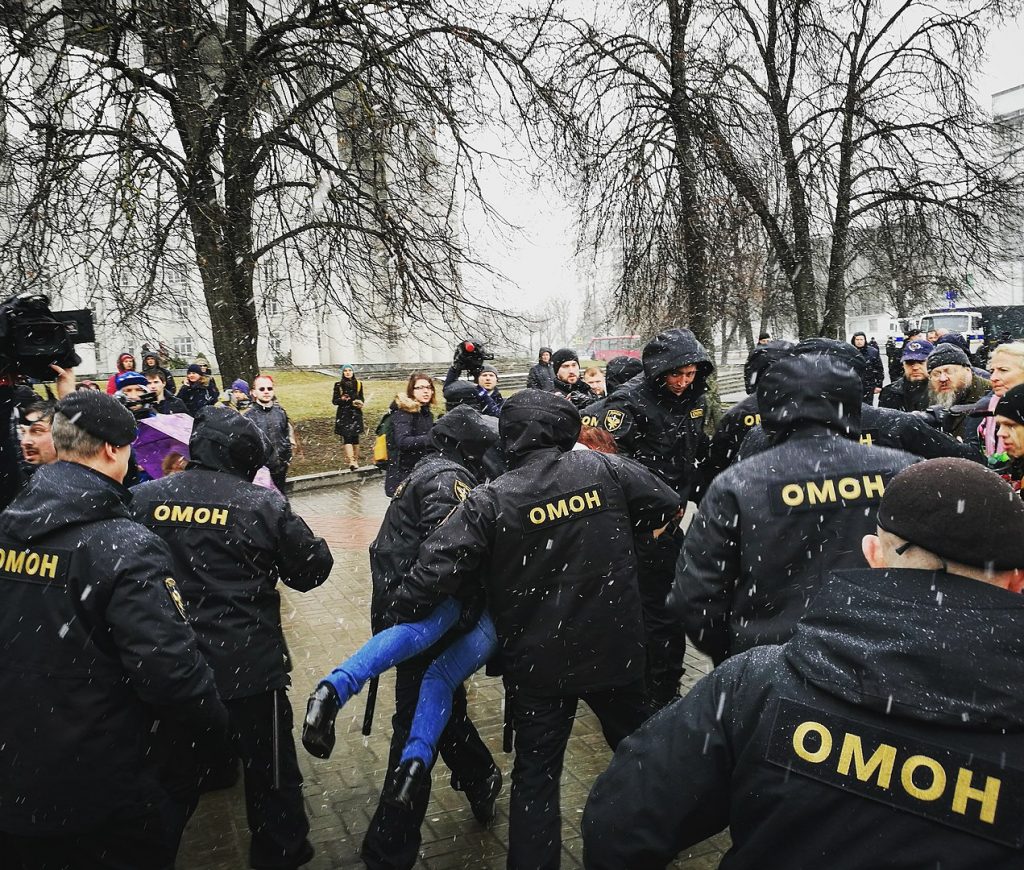
OMON special police detain protesters in Minsk on 25 March 2017. Photo by Anton Motolko from Wikimedia Commons
The struggle against fear
Now, the Belarusians are taking to the streets again, not only in anger at the detention of prospective presidential candidates, but also at the mismanagement of the country, the lack of prospects for the next generation, the hollowing out of the law and the constitution, and at repression and state despotism. People are demanding opportunities for private enterprise, political reform and the right to free and fair elections. Many openly say that they are sick of Lukashenka. A new level of frustration and criticism has been reached.
The COVID-19 crisis has undoubtedly accelerated the new readiness to protest. From the start, Lukashenka refused to recognize the emergency, recommending that people protect themselves against the virus by drinking vodka and driving tractors. He made cynical remarks about individuals suffering from COVID-19, damaging his father-figure image and recalling the historical events of Chernobyl and Kurapaty – events that eroded trust in the state and led to a change of mentality.
With the help of crowdfunding and grassroots initiatives, the population instead organized its own support, protection and quarantine measures, networking with government ministries and authorities. Survival strategies internalized over centuries became evident once again. The population’s success in taking matters into its own hands during the pandemic is now benefiting the protests.
Media surveys on socio-political issues have been prohibited since 2012, making it difficult to say how important democratic values are to the demonstrators. What is not difficult to identify, however, is a desire for change and a fracturing of the social contract. According to the political scientist Mikita Merzlou, there has been an erosion of the ‘subservient and benevolence-focused political culture’.
This may be a pivotal moment in the country’s recent history. In an interview with Rzeczpospolita, Babaryka somewhat dramatically linked recent events with key points in the history of the country: ‘These are events that shaped our statehood. The first is the coronation of the Lithuanian ruler Mindaugas, the second is the declaration of independence of the Belarusian People’s Republic in 1918, and the third is the creation of the Belarusian state after the collapse of the Soviet Union.’
The Belarusians are now struggling against their own fear. ‘We’ve had enough of being afraid’, as one popular Facebook group calls itself. Internet memes ridicule the fact that Lukashenka’s support rating is only three percent. At the end of May, a number of independent online media broke the law by running surveys asking people which prospective candidate they would vote for. Lukashenka received very low, single-figure results. Although the surveys were not representative, the ironic slogan ‘3 per cent’ came to be used among protesters.
Today, the Lukashenka regime faces the greatest challenge of its twenty-five-year existence. What will happen between now and the ‘election’ on 9 August is fairly predictable. Whether the regime will be able to prevent the spark of opposition spreading depends largely on protesters’ ability to channel their anger and frustration into a more organised and orchestrated form of protest. It will also be crucial whether the tens of thousands of employees in state-run companies – for example the tractor manufacturers – join the protests in Minsk. All that we can hope for is that there is no bloodshed.
Vasil Býkaŭ returned to his homeland from exile in the Czech Republic a month before he died. His funeral in Minsk on 25 June 2003 was attended by thousands. It was a moving act of homage to a writer who had looked deep into the Belarusian soul. Býkaŭ’s literary figures are ‘hostages to historical circumstances’, as Ivan Afanasyev writes in the History of Belarus Handbook. Like the Belarusians throughout history, they are the playthings of higher powers and greater minds, not protagonists whose fate is in their own hands.
With the current protests, this seems finally to have changed. It has been a long and evolutionary process that has led the Belarusians to realize that they are subjects of an independent state, with the power to take action themselves. But how soon this path will lead to them to democracy remains uncertain. Social issues will play a decisive role. The family life over which Lukashenka presides has broken down. Now, more than ever before over the last two and half decades, the social contract can only be held together by violence and repression. The Belarusians are ready to embrace a different life.


